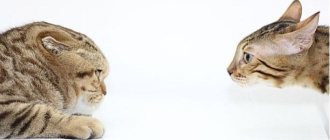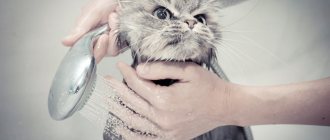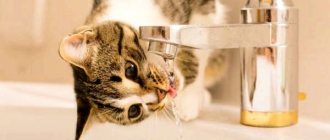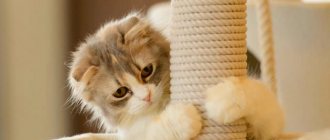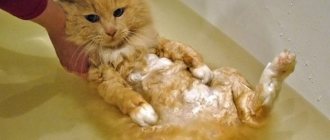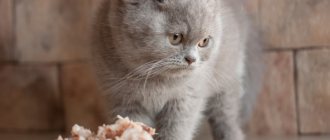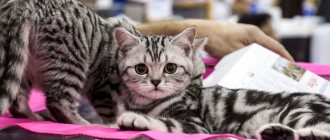Heredity – a pet’s behavior is determined by genes
This is, of course, the first thing that comes to mind. Character traits, just like color, for example, can be inherited by a cat from its ancestors. In outbred animals, whose parents are usually unknown, and the character can turn out to be anything - it’s a lottery.
But it is quite appropriate to talk about such a concept as the character of the breed. After all, a breed is nothing more than a group of animals selected for certain characteristics and genetically related to each other. Owners of purebred cats will probably agree that, for example, the British, as a rule, are not inclined to sit on their hands and do not tolerate familiarity, but they really love to play with a person. And Maine Coons, despite their enormous size, are generally calm and docile.
What personalities do cats have?
March 20, 2014
Category: Animals
Today cats live in almost every home. They were loved by both adults and children. The question of choosing a pet breed always makes us think, and the appearance of the animal does not always play a decisive role, since it is worth understanding that different breeds have their own character. Some cats are more docile and affectionate, while others will demonstrate their temper with regular intervals, and they will cause considerable damage to their owner’s apartment. As for the connection between the cat’s breed and character, nothing can be said specifically here, since much will depend on the upbringing of the pet and its genes. No matter what breed you get a cat, it will have its own personal character, which it will only show as it matures.
The characters of cats can be divided into several types, which is what we will do now. Let's look at the most common of them. The first place should be given to bully cats. Such cats are distinguished by their particular activity and the fact that they behave extremely wayward. They are not afraid of your prohibitions and punishments. They will do what they want and see fit. Such pets will cause inconvenience to their owners and cause significant damage to the house in which they live. What can be done in such a situation? You need to teach such a pet to understand the word impossible, because otherwise the cat will continue to behave inappropriately, and you will continue to cause damage in your own home and waste a lot of nerves. It is also worth identifying the reason for this behavior, since there is often one. The cat may be scared and through this behavior it may simply be protecting its territory and interests.
You can also note the slob cats that will refuse to go into a special tray. They will constantly shit in different places, which will subsequently lead to an unpleasant odor in your home. It is worth taking care of the health of your pet. It is necessary to pay attention to his living conditions in general. Perhaps he is simply uncomfortable going to the toilet that you prepared for him. Often cats can behave this way in order to show their owner their dissatisfaction with something. It’s worth trying to change the tray and the filler in it. The areas where the cat has pooped before need to be cleaned. Treat them with vinegar and cover with foil. You need to spend more time communicating with the animal, and soon all problems will be solved by themselves.
Some cats have a whiny character. As soon as the owner leaves the house, the cat begins to cry. The first thing that comes to many people’s minds is to simply feel sorry for such a cat and feed it. But in practice, such actions are not always justified, and such measures lead nowhere. In fact, there is a way out of this situation. You just need to create a secluded corner in your home for your cat in which she will feel comfortable. This way, after you leave, the cat will feel safe.
There are hooligan cats who will destroy everything in their path. It is simply impossible to live with a cat of this nature under one roof. This behavior is usually justified by the fact that the cat has nowhere to put its energy. You should bring an object into the house that can distract the cat's attention. This could be some kind of toy or scratching board. However, it could be anything. Believe me, your pet will only be grateful to you for such a gift. And it will become much easier for you to live with such a pet.
The character of a cat can be determined by its facial expression.
Keith Jenkins, one of the directors of PetSmart Charities, which, by the way, helps homeless animals in the United States, is sure that the character of a cat can be determined by the expression of its face - if I may, I will still use the word “face”.
This theory is based on the fact that an animal's hormones influence the growth and shape of its bones, and they also influence behavior and character. Thus, there is a relationship between facial features and the characteristic behavior of a cat. The source does not indicate whether any experiments were carried out on this matter, but sometimes, indeed, the character of an animal is, as they say, written on its face.
True, exceptions are not uncommon.
Character traits
The kitten should be calm and friendly. When you first meet, wait until he approaches you. If he doesn’t do this, moreover, he scratches and bites when you try to pick him up, then you shouldn’t choose him. The kitten feels that you are somehow not suitable for him. And as you know, intuition in cats is very developed.
See how kittens of the same litter behave. They probably have a leader. If he is a bully and offends his brothers and sisters, then in the future it will not be easy to deal with such a proud person. The character of cats does not change. Often they try to “educate” the owner, and not vice versa. Also discard a timid and indecisive kitten, because he is most likely incurious. And curiosity is one of the main traits of a normal cat.
Also observe the behavior of the kitten's mother. And if there is an opportunity, then it’s up to the father. The friendliness and calm nature of parents are transmitted as easily as fearfulness and aggression. Of course, there are exceptions to every rule.
The character of the future cat greatly depends on the conditions in which the kittens were kept in the first weeks of life. If they were surrounded with love, they played with them a lot, and were not punished cruelly, then there are all the prerequisites for such a kitten to grow into an interesting, inquisitive in the good sense of the word, charismatic cat.
When choosing, the age and temperament of the future owner also matter. An aggressive cat should not be brought into a home with small children. It is more difficult for people of retirement age to cope with hyperactive cats, etc.
The character of a cat depends on its upbringing
Before starting an independent life, kittens spend quite a lot of time next to their mother cat. And her behavior largely influences how the kittens will behave in the future. For example, a cat that doesn't trust people will pass this mistrust on to its children.
In addition, it has been scientifically proven that the cat-dad, even if he does not participate in any way in raising the kitten, also influences his habits and preferences. What is most surprising is that this effect appears even before the birth of kittens, during their embryonic development.
Cat character: only five options
Theory ALL ARTICLES 52465
Young researchers from Great Britain (not yet “British scientists,” but almost there) have discovered five “personality types” of domestic cats. A team of researchers from the University of Lincoln's Center for Cat Care, led by School of Life Sciences research fellow Lauren Finka, carefully surveyed more than two hundred cat owners about the behavior and habits of their pets.
Photo: Lauren Finka and Hamish the cat, Cat Welfare Center
Based on the survey results, they concluded: all cats can be divided according to their character and behavior into five “personality types.”
These are Cats-People, Cats-Cats, Cats-Hunters, as well as Quarrelsome Cats and Curious Cats. The difference in cat personality types is due to a complex interaction of hereditary factors, upbringing and life experiences.
Describing cat "personality types" will help you understand what type your cat is and how best to treat her.
I. Cat-Man
Human cats, as a rule, are happy to share his home, his life and even his personal space with his owner. Such a cat can be recognized by its characteristic movement: it likes to gently “butt” its owner with its head from time to time. She also loves to lie on her owner’s lap and, most likely, regularly “tramples” or “claws” him with her paws.
The ideal environment for a Human Cat is an active family where members can rub noses with or take a nap on their lap. Such cats most often become characters in funny photographs on the theme “If it fits, I sits” - “If I fit, then I sit.”
Photo: imgur.com
For a friendly Cat-Man, there is nothing more important than human attention. And the more there is, the better.
II. Cat Hunter
All cats are natural hunters, but for cats of this type, hunting becomes the meaning of life. No one but them knows how to track, sneak up and attack like that. You can recognize a hunter cat by its attitude towards realistic soft toys. The Cat-Hunter most often does this with these toys: he clamps them in his teeth and begins to frantically kick them with his hind paws.
Photo: Helen Cook/CC
The best place of residence for such cats is a country or village house. There, in freedom, the Cat-Hunter finds himself: he endlessly explores the surroundings, tracks down prey and hunts. And all this without the risk of falling out of a high-rise building window or getting hit by a car on a city street.
III. Cat-Cat
Just as Human Cats become this way as a result of close communication with humans from early childhood, Human Cats grow from kittens that have had positive experiences with other cats. These Cat Cats do not perceive other cats as a threat to their territory or resources. From an early age they get used to living, communicating and playing with other cats and kittens.
Such cats are easy to recognize by their communication with other cats: they nudge each other, are always ready to play and lick each other.
Female cats do best in feline company, but even highly socialized cats can be very picky about their friendships.
This type of cat is best suited for those who spend most of the day outside the home - for example, young couples. Left to their own devices, Cat-Cats (unless there are less than two of them) have a good time in the absence of their owners. But loneliness is contraindicated for them, as for Cats-People.
IV. Quarrelsome Cat
These cats can disappoint with their low tolerance for others and especially for physical interaction with humans. They seem to always be in a state of heightened readiness for some kind of trouble. Building a comfortable relationship with such cats requires a lot of effort and time.
The distinctive features of the Fussy Cat are independence, an increased need for personal space for games and, despite normal relationships with humans, a dislike for “cuddling” and other physical affection. These are the same cats that “walk on their own.”
You can’t pick up a quarrelsome Cat just like that: you need to wait until she takes the first step.
V. Curious cat
“Curiosity killed the cat” is about them. Curious Cats are tireless explorers who sniff anything and everything. Their curiosity is the result of both heredity and the habit of interacting with new objects, smells and sounds from early childhood.
Photo: Kalle Schärlund/CC
An inquisitive Cat is recognized by its desire to thoroughly examine and study everything that is around it. It will be very interesting for her to live in a hospitable house, where someone comes all the time, and even in the office. But keep in mind: An inquisitive Cat will not let through without “checking” a single object that comes into the zone of her attention, be it a bag, box, shoe, person or an interesting detail of his clothing.
Now tell us what “personality type” your cat is!
Source: Daily Mail
research, science, cats and people
Comments ()
Log in to leave a comment
Use your social network account:
GoogleFacebookVkontakteMailruYandex
Socialization in the early stages of development
It is very important that kittens are introduced to people and other animals before they are 4 months old. If before this time they do not learn that you can be friends with a person, then it will be impossible to explain this to them - they will remain wild. Thus, at an early age, kittens develop an idea of the world and its inhabitants - and this, of course, shapes many character traits.
Life experience of a particular animal
Of course, a cat that has spent its entire life outside fighting for its life will be predisposed to guarding its territory, distrusting people and other animals, and will have completely different eating habits and preferences than a cat that was raised in a house where it loved and well fed.
If she is faced with cruelty from a person, then it is quite difficult to gain her trust. But it is quite possible if you show patience and love.
Despite the fact that cats and people belong to different biological species, the same factors influence the formation of their characters. Heredity and genes play a key role in the formation of a particular living organism; the character of a cat certainly depends on them.
But, as scientists say, this dependence is not strictly determined. A lot is determined by social factors and the influence of circumstances. And since the cat’s society is you and me, there is no point in trying to determine the cat’s character in advance. What our favorite will be depends largely on us.
How to determine a cat's character in advance?
Any person in whose life there is a place for cats will not argue that each of them has its own character.
Just as no two people are alike, animals are bright individuals with their own personal characteristics. This is especially evident if you observe at least two cats living in the same house. The conditions are the same, they feed the same, they love the same, but here you go. One may be sociable, talkative, willing to come to your knees to cuddle and purr, while the second may well turn out to be shy, distrustful, and possibly aggressive.
Many people wonder how to determine the character of a cat in advance. Is it possible to “see” something in a small kitten? Of course, there are different folk methods for choosing “that same” baby, but let’s still figure out what the cat’s character objectively depends on.
